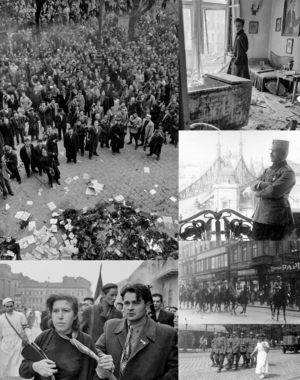Citizenry Uprising
This article is incomplete because it is pending further input from participants, or it is a work-in-progress by one author. Please comment on this article's talk page to share your input, comments and questions. Note: To contribute to this article, you may need to seek help from the author(s) of this page. |
The Citizenry Uprising, (Hétumogerian: Állampolgári Felkelés) known also as the Hétumoger Civil War or the Blue Revolution was a civil war that lasted two years and six months. The war was fought between the pro-Nemesség Second Noble Republic and the Blue Nationalist Party and several radical elements within the country after the transition into the Second Noble Republic from the Third Kingdom. The Citizenry Uprising was primarily focused in the eastern regions of Hétumoger. The Blue Nationalist Party and their paramilitary radical organizations were composed of mainly of lower-class Polgárság. The conflict was started by the Kisigmánd Emergency after the Blue Nationalist Party was deemed an illegal organization by the Országgyűlés and kicked members out of the Népkormány. Paired with the ongoing philosophical-political movement of the Néma Forradalom, Hétumoger was plunged into conflict.
The Néma Forradalom had been going on since 1901 since the Third Kingdom, where Hétumogerian society had experienced a growth in population and a rise in urbanization under Zgismond Nagy II. The Rendszer-Helyreállítás that was meant to reform the public sector became a disaster due to the mismanagement by Zgismond and his government, creating instability with the Kingdom and its rule by both the Polgárság and the Nemesség. The improving social conditions that were stopped by the reforms caused the Néma Forradalom to begin as a mainly Polgárság movement. Several different political groups and ideological groups came together, leading to a struggle for the spotlight on the political stage which was soon swept by a new movement coming from Nagymező called Blue Nationalism. Originally thought of by the Blue Vanguards, the movement saw extreme popularity in its radicalism by the Polgárság. Eventually, Zgismond would resign and call for a reformation in government, seeing the failure of the monarchy. The Second Noble Republic was formed, but was embroiled in political conflict by then when the Népkormány was reconvened and the anti-Nemesség party, the Blue Nationalist Party, became the most popular party during the 1909 Népkormány election.
After the 1909 election and the establishment of a Blue Nationalist majority in the Népkormány, the Blue Vanguards moved the majority of their base of operations from Nagymező to Komárom in Kisigmánd. Over the course of 15 years, the Blue Nationalist party only grew in size and went from a majority to an overwhelming majority party. After the passing of Resolution 65-094 in the Népkormány, the Országgyűlés opted to move for an executive action and illegalize the Blue Nationalist Party.
Background
Prelude
| Citizenry Uprising Background | ||||||||||||||||||||
|---|---|---|---|---|---|---|---|---|---|---|---|---|---|---|---|---|---|---|---|---|
 | ||||||||||||||||||||
|
||||||||||||||||||||
The beginning of the Citizenry Uprising is traced back to the Coronation of Zgismond II, who was an Először Nemesség of Koháry. Zgismond was crowned in 1875 in a referendum by the Országgyűlés, leading to the dissolvement of the government of the First Noble Republic of Hétumoger and the establishment of the Third Kingdom of Hétumoger.
Blue Nationalism
Corporate Involvement
During the Néma Forradalom, many investors and weapon armament companies were scouted by Zgismond's Internal Development Agency that was






